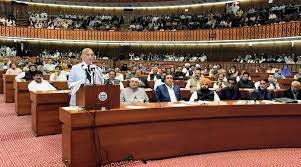Pakistan’s Prime Minister, Shehbaz Sharif, has initiated discussions with allied parties regarding the selection of an interim administration, signaling the government’s intention to dissolve the National Assembly before its scheduled completion in mid-August. Senior leader of the Pakistan Peoples Party (PPP), Qamar Zaman Kaira, revealed this information during an interview on a Geo News program. Sharif had recently announced that his government would transfer power to a caretaker setup prior to the conclusion of its tenure next month.
In his statement, Kaira stated that the prime minister would engage in consultations with the opposition leader following deliberations with coalition partners. The move suggests that Sharif’s government is preparing for a potential dissolution of the National Assembly and subsequent early elections. Such a decision would require the formation of an interim administration to oversee the country’s affairs until new elections can be conducted.
The process of selecting an interim administration involves considering candidates who are politically neutral and capable of maintaining stability and facilitating a smooth transition. These interim arrangements are typically temporary and are put in place to ensure the continuity of governance while the country prepares for fresh elections. The consultation process with allied parties is an important step towards establishing broad consensus and inclusivity in the decision-making process.
The news of a potential early dissolution of the National Assembly has sparked speculation and debate across the political landscape. While the move would provide an opportunity for the ruling party to solidify its position and seek a renewed mandate, opposition parties have raised concerns about the timing and potential implications of such a decision. Dissolving the assembly prematurely would necessitate the cancellation of pending legislative work and would require parties to recalibrate their strategies for the upcoming elections.
The PPP, as a prominent opposition party, will play a crucial role in determining the course of action in response to the government’s intentions. As Kaira’s statement suggests, the opposition leader will be consulted after discussions with coalition partners, indicating a desire to engage in a broader dialogue and consider multiple perspectives. The involvement of opposition parties in the decision-making process is crucial for maintaining democratic principles and fostering a sense of inclusivity.
It is worth noting that the selection of an interim administration and the dissolution of the National Assembly are significant political maneuvers that have the potential to shape Pakistan’s political landscape in the coming months. The successful execution of these processes requires careful planning, transparent decision-making, and adherence to constitutional norms. The government’s efforts to consult with allied parties and the opposition leader reflect a commitment to democratic practices and the pursuit of consensus.
As the discussions progress and more information becomes available, it is essential for the government, opposition parties, and the general public to engage in constructive dialogue and maintain a peaceful political atmosphere. The democratic transition process, including the formation of an interim administration and subsequent elections, should be conducted in a fair and transparent manner, ensuring equal opportunities for all political actors.
Prime Minister Shehbaz Sharif’s consultations with allied parties regarding the selection of an interim administration indicate that the government is considering the dissolution of the National Assembly before its scheduled completion. The involvement of opposition parties in the decision-making process is crucial for upholding democratic values and ensuring inclusivity. As Pakistan moves forward with these political developments, it is important to foster constructive dialogue and uphold constitutional norms to facilitate a smooth transition and fair electoral process.



